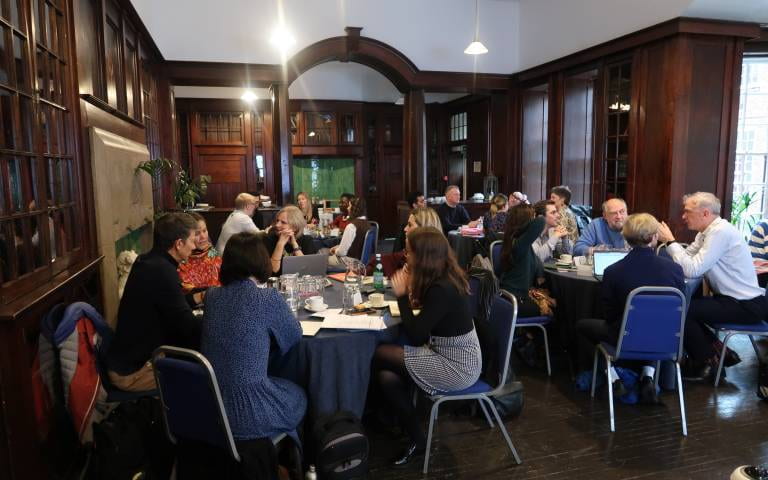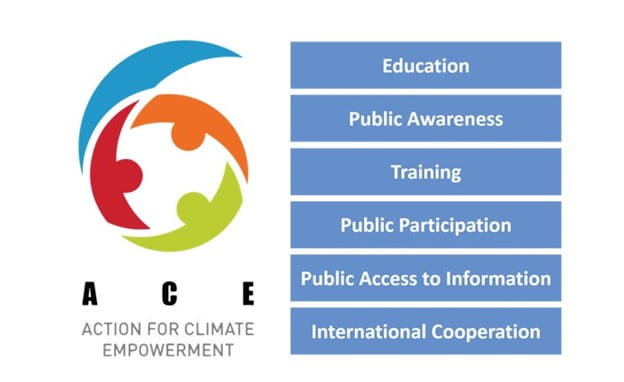Action for Climate Empowerment: why this ‘policy glue’ needs a cross-government approach
By Blog Editor, IOE Digital, on 30 November 2023

UCL-convened workshop on Action for Climate Empowerment in the UK, November 2023. Credit Kate Greer, UCL.
30 November 2023
By Kate Greer
Action for Climate Empowerment (ACE) is a workstream of the UN Framework Convention on Climate Change (UNFCCC), discussed previously on this blog, which seeks to engage all citizens in climate action via six areas of activity: education, training, public participation in decision-making, public access to information, public awareness, and international cooperation.
At a recent workshop for people and organizations whose work intersects with ACE, hosted by UCL, the diverse ways in which the ACE policy framework can be made concrete was apparent. The workshop brought together people whose work focuses on (…take a deep breath…): schools, higher and informal education; public engagement through faith communities, museums and the arts; advocacy on behalf of children, youth, people living with disabilities, and non-human species; alongside policy development and research funding. It was described by one participant as a ‘paper clip’ that held a disparate group of people and expertise together for half a day. Building on this metaphor, I wonder whether ACE can be viewed as ‘policy glue’ to hold them together over the longer term.
However, if ACE is to cohere such efforts into something impactful across the UK – something that is more than the sum of these disparate parts – it arguably needs a resolutely cross-government approach.
ACE in the UK, from the ground up
A vibrant and extensive community of stakeholders is working from the ‘ground up’ to implement ACE-aligned activity across the UK. This commitment was apparent in the enthusiastic responses to our workshop invitation, and during discussions.
The workshop reaffirmed that activity aligned to the ACE elements has tended to focus a lot of attention on formal education, demonstrated by the long-term energetic and optimistic efforts of organisations such as SOS-UK and university members of SDSN-UK, alongside more recent initiatives such as support for teachers being provided by the UCL Centre for Climate Change and Sustainability Education (CCCSE). Activity extends across other ACE elements too, for example, into training through the work of Nifty Sustainability, into public awareness through Wellcome’s work on climate and health, and into public participation by championing youth engagement in climate change decision-making – through Mock COP and Plan International’s Youth for Education in Emergencies, the ‘Britain Talks Climate’ programme of Climate Outreach, and advocacy for people living with disabilities by CBM the overseas disability charity. ACE-aligned activity in the UK abounds!
Notably, many of the participating organisations described how they are advocating for the engagement of marginalized groups in climate change decision making processes – at international, national and local levels. Each year’s COP brings heightened attention to issues related to engagement (for example, policy briefings have set out the challenges and opportunities related to youth participation, whilst Human Rights Watch has more recently highlighted concerns about accessibility at this year’s COP). But climate change policymaking extends beyond this annual international forum and, as our workshop participants stressed, it concerns every member of society.

The six ACE elements / UN Framework Convention on Climate Change.
Thus, ACE offers a policy framework that can support advocacy for those who traditionally find themselves without a seat at decision-making tables, including people who are excluded or overlooked because of age, (dis)ability, gender and sexuality, race, or economic means. Such diverse engagement is essential for enabling all UK citizens – no matter their circumstances – to be empowered to respond to ACE. Moreover, widespread engagement is essential if we are to reach a social tipping point which demands that our governments show, as the recent Oxfam report Climate Equality: A Planet for the 99% argues, the ‘political courage’ to use national and global governance levers to target the most ‘carbon-hungry’ members of society.
ACE, from the top down
If we take our workshop as a microcosm of the impetus and efforts afoot across the UK, the potential is clear. Despite some workshop participants initially wondering why they were there, it seems that many find ACE to already be a useful framework for positioning their work (especially if they are international in outlook), whilst others are curious or keen to align themselves with it. But this is a ‘ground up’ view; what about the ‘top down’ perspective?
Globally, the ACE work programme is supported by an ACE action plan to which the signatory countries are ‘invited to engage in and support implementation … while maintaining a country-driven approach’. Recent policy-like publications and programmes from the Department for Education, such as the sustainability and climate change strategy for schools and children’s services, and their commitment to UNESCO’s Greening Education Partnership, could be framed as part of a UK-wide response to this action plan. A more cohesive cross-governmental response would weave together policies and programmes of other government departments. It could articulate, for instance, how the UK climate change risk assessment reports (Climate Change Committee) are supporting public participation in local decision making; the role of libraries as crucial in-community mobilisers of public awareness on climate change (Department of Culture, Media and Sport); and how the UK Business Climate Hub (Department of Energy Security and Net Zero, which hosts the UK ACE focal point) can support training. Further, a coherent cross-government UK ACE approach would align activities from across the UK, such as Climate Action Wales or the long-running Learning for Sustainability in Scotland.
As we well know, the clock is ticking on action to ameliorate the worst effects of climate change. Drawing from the impetus of international frameworks like ACE, a cross-government strategy that addresses each of the ACE elements could further bolster an already active UK ACE community.
 Close
Close



